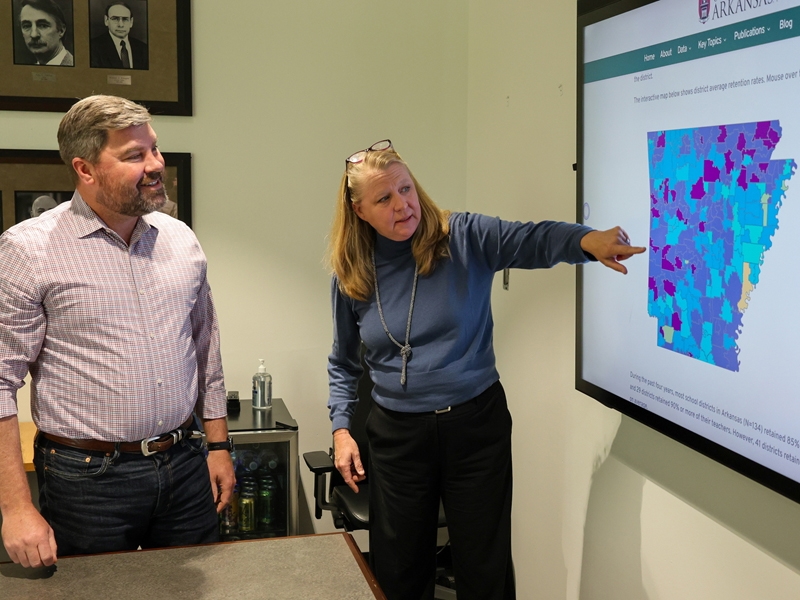Office for Education Policy Secures Grant to Expand Early Childhood Education Research
Office for Education Policy Secures Grant to Expand Early Childhood Education Research University of Arkansas Newswire


The Walton Family Foundation Grants Funds to Enhance Early Childhood Education Research in Arkansas
May 03, 2024

Office for Education Policy Associate Director Josh McGee and Executive Director Sarah McKenzie.
The Walton Family Foundation has awarded a new grant to the College of Education and Health Professions’ Office for Education Policy to enhance its research into early childhood education in Arkansas.
The new three-year grant totaling over $400,000 will allow the Office for Education Policy to expand its early childhood education work by supporting data collection and research in four main areas: finance, labor force, quality measures, and evaluation of programs and policies.
The office already has several projects in the works that will leverage this new funding support. These include:
- An assessment of early childhood revenues and expenditures
- Developing early childhood awards and recognitions
- Partnering with groups like Early Care and Education Projects to evaluate the outcomes of early childhood policies and programs
“High-quality early childhood education can provide a strong starting point for students’ K-12 learning experience,” said OEP Executive Director Sarah McKenzie. “By gaining a thorough understanding of early childhood education in Arkansas, we can create a roadmap for future policies and promote student success.”
In collaboration with the Arkansas Department of Education, the office’s data efforts will center around improving the amount and quality of data collected about the childhood education ecosystem and creating a link to the state’s K-12 data. Overall, the goal will be to move Arkansas “toward having a best-in-class cradle-to-career data system that can be seamlessly leveraged to deliver actionable insights.”
The Office for Education Policy, founded in 2003, is a research unit of the College of Education and Health Professions’ Department of Education Reform. It has served as a key resource for the state’s education stakeholders for over 20 years. The office bridges the gap between research and practice, using data and evidence to improve pre-K-20 education in Arkansas.
The Office for Education Policy is led by McKenzie and Josh McGee, associate director. McKenzie and McGee are professors in the Department of Education Reform and specialize in education policy and research at the state and national levels.
McKenzie holds a Ph.D. in educational statistics and research methods, serves as a subject matter expert for the U.S. Department of Education, and is a certified teacher with experience teaching students from pre-K to the university level.
McGee holds a Ph.D. in economics. He previously served as chief data officer for the State of Arkansas and has extensive experience working in leadership roles in education, government, nonprofits, and philanthropy. In August 2024, he will become the Department of Education Reform’s Endowed Chair in Education Accountability and Transparency.
Visit the Office for Education Policy website for more information on education research projects, data sets, and more.
SDGs, Targets, and Indicators
1. Which SDGs are addressed or connected to the issues highlighted in the article?
- SDG 4: Quality Education
The article discusses the Walton Family Foundation’s grant to the College of Education and Health Professions’ Office for Education Policy to enhance research into early childhood education in Arkansas. This directly relates to SDG 4, which aims to ensure inclusive and equitable quality education and promote lifelong learning opportunities for all.
2. What specific targets under those SDGs can be identified based on the article’s content?
- Target 4.2: By 2030, ensure that all girls and boys have access to quality early childhood development, care, and pre-primary education so that they are ready for primary education.
- Target 4.7: By 2030, ensure that all learners acquire the knowledge and skills needed to promote sustainable development, including among others through education for sustainable development and sustainable lifestyles, human rights, gender equality, promotion of a culture of peace and non-violence, global citizenship, and appreciation of cultural diversity and of culture’s contribution to sustainable development.
The article mentions that the Office for Education Policy will be conducting research in areas such as finance, labor force, quality measures, and evaluation of programs and policies in early childhood education. These efforts align with Target 4.2, which focuses on ensuring access to quality early childhood development and pre-primary education. Additionally, the goal of promoting student success through understanding early childhood education in Arkansas relates to Target 4.7, which aims to provide learners with the knowledge and skills needed for sustainable development.
3. Are there any indicators mentioned or implied in the article that can be used to measure progress towards the identified targets?
- Indicator 4.2.1: Proportion of children under 5 years of age who are developmentally on track in health, learning, and psychosocial well-being, by sex.
- Indicator 4.7.1: Extent to which (i) global citizenship education and (ii) education for sustainable development, including gender equality and human rights, are mainstreamed at all levels in: (a) national education policies, (b) curricula, (c) teacher education, and (d) student assessment.
The article mentions the focus on evaluating outcomes of early childhood policies and programs, which can be measured using Indicator 4.2.1. This indicator assesses the proportion of children under 5 years of age who are developmentally on track in health, learning, and psychosocial well-being. Additionally, the goal of promoting sustainable development and cultural diversity in education can be measured using Indicator 4.7.1, which evaluates the extent to which global citizenship education and education for sustainable development are mainstreamed in national education policies, curricula, teacher education, and student assessment.
SDGs, Targets, and Indicators Table
| SDGs | Targets | Indicators |
|---|---|---|
| SDG 4: Quality Education | Target 4.2: By 2030, ensure that all girls and boys have access to quality early childhood development, care, and pre-primary education so that they are ready for primary education. | Indicator 4.2.1: Proportion of children under 5 years of age who are developmentally on track in health, learning, and psychosocial well-being, by sex. |
| SDG 4: Quality Education | Target 4.7: By 2030, ensure that all learners acquire the knowledge and skills needed to promote sustainable development, including among others through education for sustainable development and sustainable lifestyles, human rights, gender equality, promotion of a culture of peace and non-violence, global citizenship, and appreciation of cultural diversity and of culture’s contribution to sustainable development. | Indicator 4.7.1: Extent to which (i) global citizenship education and (ii) education for sustainable development, including gender equality and human rights, are mainstreamed at all levels in: (a) national education policies, (b) curricula, (c) teacher education, and (d) student assessment. |
Copyright: Dive into this article, curated with care by SDG Investors Inc. Our advanced AI technology searches through vast amounts of data to spotlight how we are all moving forward with the Sustainable Development Goals. While we own the rights to this content, we invite you to share it to help spread knowledge and spark action on the SDGs.
Fuente: news.uark.edu

Join us, as fellow seekers of change, on a transformative journey at https://sdgtalks.ai/welcome, where you can become a member and actively contribute to shaping a brighter future.







